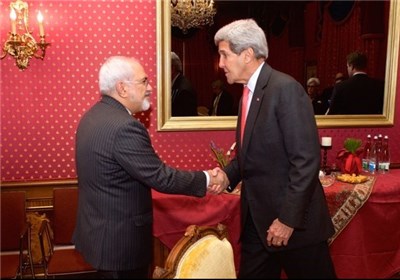LATEST
Iran’s Foreign Minister Mohammad Javad Zarif meets US Secretary of State John Kerry in Geneva on Saturday, amid the effort to reach a comprehensive nuclear agreement by June 30.
Iran and the 5+1 Powers (US, Britain, France, Germany, China, and Russia) are drafting the final text, with further sessions in Vienna this week. However, the process has been threatened by escalating debate over inspections of Tehran’s military sites.
The issue had not been high on the agenda throughout the talks, up to the agreement of a nuclear framework on April 2. However, earlier this month, International Atomic Energy Agency head Yukiya Amano insisted that the IAEA must have access at any time to the military sites.
Iranian officials immediately rejected the demand, even as they said they would adhere to the Additional Protocal of the Nuclear Non-Proliferation Treaty. Amano has persisted, and this week French Foreign Minister Laurent Fabius said Paris would not accept a deal without unrestricted inspections.
On Friday, Iran’s lead nuclear negotiator, Deputy Foreign Minister Abbas Araghchi, told reporters, “What the Supreme Leader stated about prohibiting access to individuals [nuclear scientists] for interviews and also prohibiting inspections of military centers is a very serious and decisive instruction, and the other side has been clearly informed.”
Araghchi said that the 5+1 Powers had proposed “managed access” to certain Iranian sites and individuals to address concerns of possible military dimensions of Tehran’s nuclear program: “[This] proposal was not accepted.”
Delivering the Tehran Friday Prayer, Hojatoleslam Kazem Seddiqi said, “The West’s inspection of Iran’s military sites would [be] counter to commandments of [the] Qur’an.”
He emphasized that “the [Supreme] Leader of the Revolution determines…[the] red lines of the regime” in the negotiations.
Iran’s Ambassador to the IAEA, Reza Najafi, reinforced the line with a denunciation of the Agency’s latest report, saying it repeated unsubstantiated allegations about possible military dimensions.
“The latest report, when compared to earlier ones, shows the IAEA has nothing new to present concerning the implementation of the Safeguards Agreement in Iran,” said Najafi.
Meanwhile, a US official said that “a lot of issues have gone about as far as they can go” without political decisions.
He maintained, ““We absolutely believe it is possible to get this done by June 30.” Rebuffing the statement of both Araqchi and French officials this week, the official said, “We are not contemplating an extension.”
The unnamed source did not cite the inspections issue, instead saying that Iran has “always been very focused on the pace of sanctions relief”.
Rouhani Challenges Parliamentary Critics Over Nuclear Talks
President Rouhani has challenged the Government’s critics in Parliament over the nuclear talks: “The negotiating team moves within the framework of the Islamic establishment’s opinions and red lines and knows how to speak and is moving in the right path.”
A group of MPs — some linked to former President Mahmoud Ahmadinejad — have claimed that Iran’s negotiators are weak and not defending Tehran’s “red lines” in the talks with the 5+1 Powers. The challenge culminated in a closed-door meeting last Sunday with Mohammad Javad Zarif, in which one legislator was filmed loudly and angrily berating the Foreign Minister.
Rouhani told officials of Iran’s Interior Ministry, governors-general, and governors on Saturday that critics must speak “with honesty”. He asked, “Who has the right to talk to the diplomacy czar [Zarif] in an impolite tone? Where did that impoliteness come from?”

